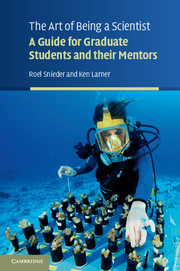Book contents
- Frontmatter
- Contents
- 1 Introduction
- 2 What is science?
- 3 Choices, choices, choices
- 4 The adviser and thesis committee
- 5 Questions drive research
- 6 Giving direction to our work
- 7 Turning challenges into opportunities
- 8 Ethics of research
- 9 Using the scientific literature
- 10 Communication
- 11 Publishing a paper
- 12 Time management
- 13 Writing proposals
- 14 The scientific career
- 15 Applying for a job
- 16 Concluding remarks
- Appendix A Further reading
- Appendix B A sample curriculum
- Appendix C The Refer and BibTeX format
- References
- About the authors
- Index
13 - Writing proposals
Published online by Cambridge University Press: 05 June 2014
- Frontmatter
- Contents
- 1 Introduction
- 2 What is science?
- 3 Choices, choices, choices
- 4 The adviser and thesis committee
- 5 Questions drive research
- 6 Giving direction to our work
- 7 Turning challenges into opportunities
- 8 Ethics of research
- 9 Using the scientific literature
- 10 Communication
- 11 Publishing a paper
- 12 Time management
- 13 Writing proposals
- 14 The scientific career
- 15 Applying for a job
- 16 Concluding remarks
- Appendix A Further reading
- Appendix B A sample curriculum
- Appendix C The Refer and BibTeX format
- References
- About the authors
- Index
Summary
We are all agreed that your theory is crazy. The question that divides us is whether it is crazy enough to have a chance of being correct.
Niels BohrWriting research proposals is an integral, although perhaps the least favorite, part of doing science. In an academic environment, the financial resources for carrying out the research come, to a large extent, from external sources. Similarly, in an industrial environment, research proposals are often the means by which a researcher must convey to management the value of supporting a project. Proposals thus are essential for securing research funding, but they are important for other reasons as well. Having research proposals funded shows that your research stands up to peer review, that it has the qualities judged worthy of receiving financial support, and that you are able to communicate research plans in a compelling way. It thus constitutes a sign of professional expertise in job applications and often is considered of critical importance in decisions regarding tenure and promotion. Research grants can sometimes be transferred along with the individual when switching to a new university. Bringing in already-existing research funds can positively influence the decision to make a job offer to the holder of those grants. Research grants thus not only provide the financial means to carry out research, they increase the market value of scientists applying for a job or seeking tenure or promotion.
- Type
- Chapter
- Information
- The Art of Being a ScientistA Guide for Graduate Students and their Mentors, pp. 196 - 209Publisher: Cambridge University PressPrint publication year: 2009

